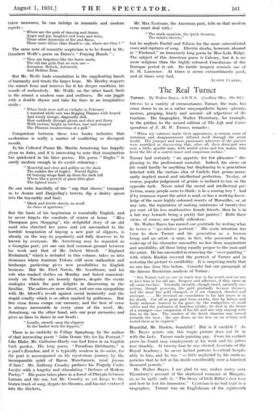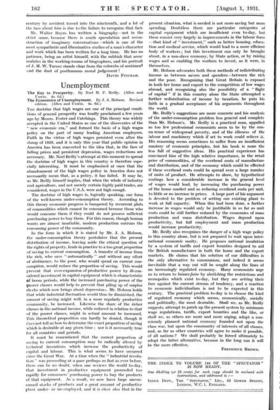The Real Turner
Turner. By Walter Bayos, A.R.W.S. (Geoffrey Bios. 10s. 6d.)
OWING to a variety of circumstances Turner, the man, has come down to us as a rather unsympathetic figure—gloomy, morose, grasping, lonely and sensual—all adjectives of de- traction. His biographer, Walter Thornbury, for example, in the preface to the second edition of The Life and Corre- spondence of J. M. W. Turner, remarks :
" When my volumes made their appearance, a certain sense of irritation and disappointment diffused itself through the artist world. The younger and more passionate admirers of the painter were mortified at discovering that, after all, their demi-god was only a little, ignoble man, with sordid views and low tastes, who lived the life of a soured miser and suspicious recluse."
Turner had certainly " an appetite for low pleasures " dis- pleasing to the professional moralist. Indeed, his views on life could hardly be anything but displeasing to a generation infected with the curious idea of Carlyle, that genius neces- sarily implied moral and intellectual perfection. To-day, of course, popular judgement of genius is inclined to run on the opposite tack. Never mind the moral and intellectual per- fection, many people seem to think ; is he a roaring boy ? And if by common report the artist is mad, or has a working know- ledge of the more highly coloured resorts of Marseilles, or, at any rate, the reputation of making mistresses of twenty-five per cent. of his less unattractive female friends, then he is in a fair way towards being a pretty fair painter Both these views, of course, are equally ridiculous.
Mr. Walter Bayes has earned our gratitude by writing what he terms a " speculative portrait." His main intention has been to show Turner and his generation as a human being and an artist—a man, in fact, who possessed in the make-up of his character sensuality no less than imagination and sensibility, all these being equally proper to the man and the artist. He has succeeded in removing the "over-painting " with which Ruskin covered the portrait of Turner and in restoring the picture to credibility. It is surprising really that no one has done this before. Consider but one paragraph of the famous Ruskinian analysis of Turner : •
" But Turner had no one to teach him in his youth and no one to love him in his old age. Respect and affection, if they came at all, came too late. Naturally irritable, though timid, naturally sus- picious, though generous, the gold gradually became dimmer, and the most fine gold changed, or if not changed, clouded and overcast. . . . He received no consolation in his last years or in his death. Cut off in great part from society, first by labour and lastly sickness—hunted to his grave by the malignitios of small critics and the jealousies of hopeless rivalry, he died in the house of a stranger—ono companion of his life and one only staying with him to the last. The window of the death chamber was turned towards the west ; the sun shone on his face on its setting and rested there as he expired."
Beautiful, Mr. Ruskin, beautiful ! But is it credible ? As Mr. Bayes points out, this tragic picture does not fit in with the facts. Turner made painting pay. From his earliest years he found easy employment at his work and his prices rose steadily. At twenty-four he was elected Associate of the Royal Academy ; he never lacked patrons to extend hospit- ality to him, and he was " so little neglected by his contem-
poraries that he left at his death considerably over a hundred thousand pounds."
Mr. Walter Bayes, I am glad to say, makes merry over
Thornbury's account of the shattered romance at Margate, or, as he aptly calls it, " The Story of little Billee's first love and how he lost his innocence." Cynicism is no bad trait in a biographer. Turner was an Englishman of the eighteenth
century by accident tossed into the nineteenth, and a lot of the fuss about him is due to the failure to recognize that fact. Mr. Walter Hayes has written a biography—not in the strict sense, because there is much speculation and recon- struction of imaginary conversations—which is one of the most sympathetic and illuminative studies of a man's character and work which has been written for a long time.- He has no patience, being an artist himself, with the rubbish that accu- mulates in the working-rooms of biographers, and his portrait of J. M. W. Turner stands clear from the cobwebs of sentiment end the dust of posthumous moral judgement !
DAVID FOItHRM.



































 Previous page
Previous page